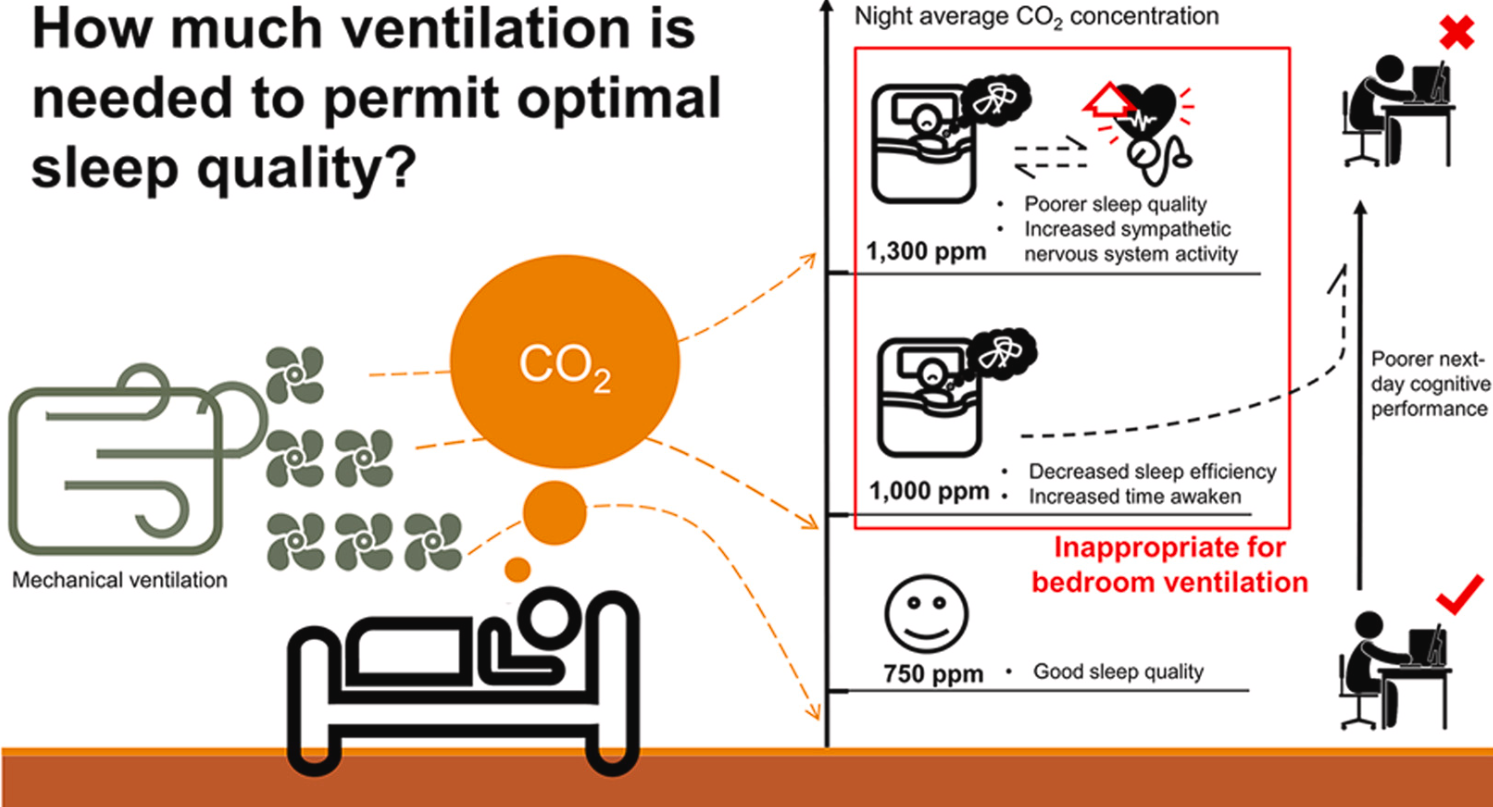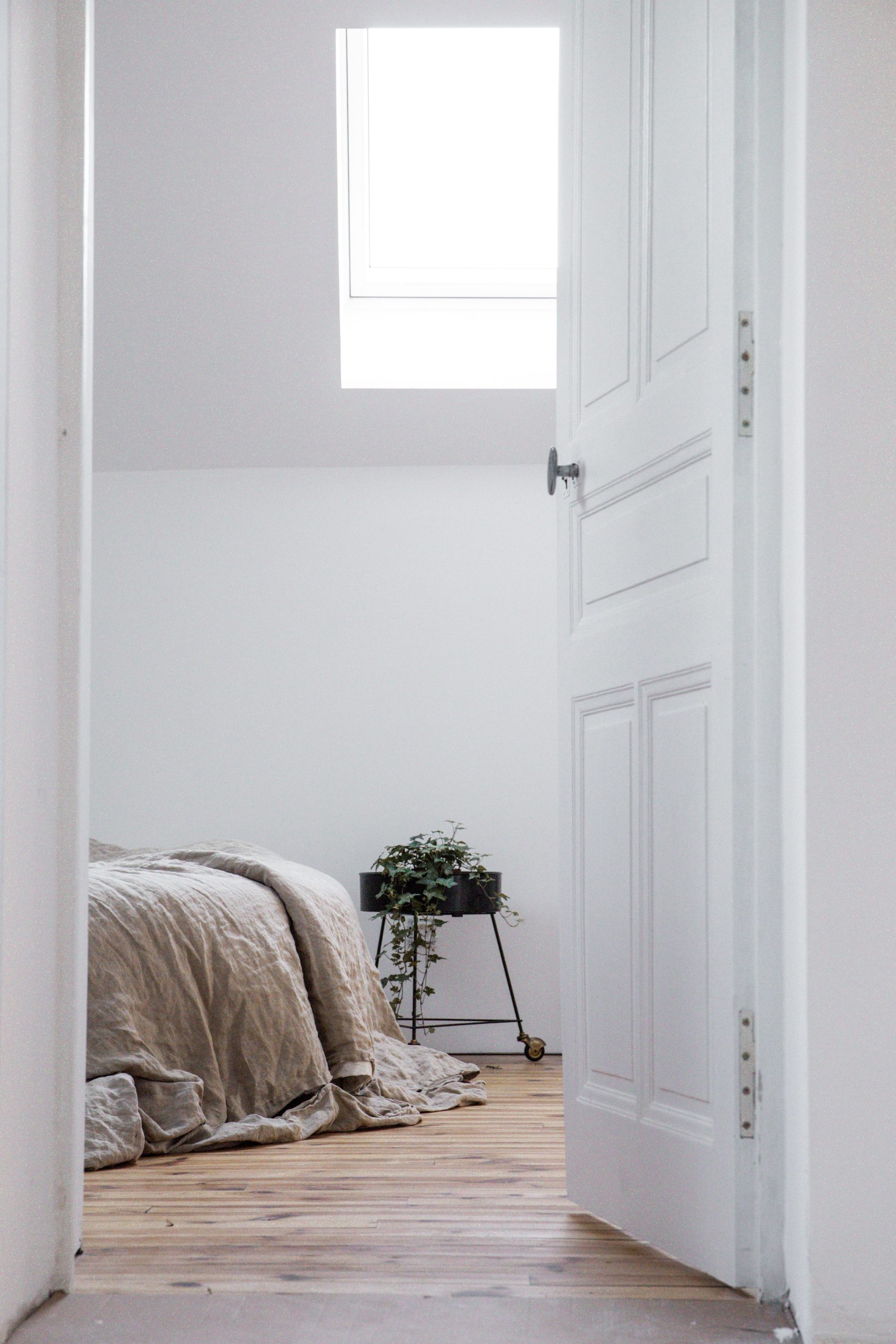Better bedroom ventilation = better sleep quality
Have you ever wondered why you’re not sleeping well? We have quite a few suggestions for better sleep, but there’s one more (invisible) thing that can negate the others: CO2. Sleeping in a stuffy bedroom does not enable quality sleep! It turns out that you need “fresh air” even when you’re not conscious of it. A new study shows that CO2 concentrations in the bedroom above 750 ppm affect your sleep and as a consequence, your cognitive performance is lower the next day.
In the 18-month study, 36 healthy college-age men and women volunteered to sleep for a week each in furnished bedrooms where their sleep was analyzed. The levels of CO2 varied during the week: the first night was not included in the study (for adaptation), but then two nights each of three ventilation conditions were used to approximate CO2 levels of 750 ppm, 1,000 ppm and 1,300 ppm. Sleep quality was monitored with wristband sleep trackers. Salivary cortisol concentrations were measured upon waking also, as elevated cortisol levels correspond with decreasing sleep quality. Overall, the researchers found that compared with ventilation causing an average CO2 concentration of 750 ppm (fresh air scenario), sleep quality was significantly reduced at the ventilation rates causing CO2 concentrations of 1,000 ppm and 1,300 ppm. Sleep efficiency was reduced by 1.3 % and 1.8 % and time awake increased by 5.0 min and 7.8 min, respectively. Deep sleep duration decreased at the ventilation rate causing CO2 concentration of 1,300 ppm as compared to 750 ppm along with a significant increase in salivary cortisol after waking, which suggests increased stress and sympathetic activity.
The takeaway from this study is to try and ventilate your bedroom with fresh air at night to simulate outdoor CO2 levels (450-500 outdoors is normal, up to 750ppm). Obviously the best way to get fresh air is to open one or more windows, and windows don’t actually need to be fully open to achieve it. By using a CO2 monitor near your bed, you can experiment to see how wide open 2the windows need to be. If you live in a quiet suburb or country setting, it’s not too hard to install insect screens and do this. However, there are lots of areas and circumstances that aren’t so simple! We want to suggest some products and ways to help.
What if it’s too hot or humid or rainy outside to open my windows?
- In this case, the best solution is to install a window air conditioning unit that has a fresh air intake (not all of them do). If you’re buying a new air conditioner, you may also want to look for one with inverter technology (it dehumidifies the air better and operates more efficiently) and upgraded air filter.
- If you have an existing window unit with no fresh air intake, you modify the weatherization around the unit (on the sides or bottom) to allow fresh air to “leak” into the room.
- If you have central air conditioning already, you should only need to open the windows about 1” to get enough fresh air to lower CO2 levels below 1000 ppm.
- If you live in a quiet but rainy area, using a product like the Invisible Awning Rain Guard, $35-40, allows you to open your windows and ventilate, even during a storm.
- If rain is the problem, here are two window fans that will help:
- Bionaire Window Fan with Twin 8.5” Reversible Airflow Blades, $55, has a water-resistant motor so that light rain won’t bother it.
- Vornado TRANSOM Window Fan with 4 Speeds, $99, also has a weather-resistant case.
What if I live in an area with a lot of air pollution, like in a city or near busy roads?
While CO2 is not good for sleep, other types of air pollution like NOx (nitrous oxides) and particulates may be just as bad or worse, so we understand the need for outside air to be filtered. Depending on the severity of your area, we have two products that can help:
- The Window Ventilation Filter, $40-50, has an 11” height and reduces dust, dirt and was tested to remove 94% of ragweed pollen. It also keeps out rain, snow and mild wind.
- Nanofiber PureAir Window Screens, $40, cover approximately 3-4 average window screen panels. They are transparent (so your view is not blocked) and use electrostatic adsorption to block particulates.
- Medify has a great selection of HEPA air purifiers which can be sized according to your room. All units are equipped with a pre-filter, True HEPA H13 or H14, and active carbon filter. The active carbon filter is what will remove the VOCs in traffic and industrial pollution.
What if I live in an area where it’s not safe to keep the windows open?
Security, of course, trumps fresh air…but you can have both if you secure a small window opening with a latch or lock. It can also prevent children from opening the window too far and falling out. One thing you’ll need to keep in mind, however, is fire safety; if the window is your safety exit in the case of a fire, you’ll need to make sure the key remains nearby if you lock it.
- MiniLatches, $69, are pricey but well-made. They are sized to allow fresh air in but prevent any indoor cats from going out.
- Stainless Steel Window Chain Locks, $19, are very sturdy
- Window Security Bars, $50 for a pack of 4, are easily adjustable and installed, and can be used on vertical or horizontal sliding windows and doors.
What if I don’t have a window in my bedroom?
“Fresh air” doesn’t always have to come from windows. If your bedroom is an interior room, you’ll need to either use the central air conditioning system or create ventilation pathways to bring in fresh air from the rest of the house.
- If your house is tightly built, it’s a great idea to add a fresh air intake. Heat recovery ventilators (HRVs) and energy recovery ventilators (ERVs) minimize the heat and humidity losses of bringing in fresh air and exhausting stale air (ERV’s are recommended for more humid climates). That way, fresh air comes into all parts of the home and having a window to open is not necessary. For more on HRVs and ERVs, check out our article here.
- If your room doesn’t have central air conditioning, you can have privacy and better ventilation by adding grilles in the wall or door. We discuss four options to do it in this article.
- If you can’t modify the walls or door, you can still have some security by using a Door Chain Lock ($7 for 2-pack) that will allow your door to open slightly and let more air flow in.
Here’s a pictorial summary of the ventilation recommendations:
The bottom line is…a lot of our comfort and well-being depends on how well we sleep. Measure your bedroom CO2 in the morning before exiting (with the door closed) and if it’s above 1000 ppm, research your options for better ventilation. Ventilate your bedroom tonight for a better day tomorrow!


